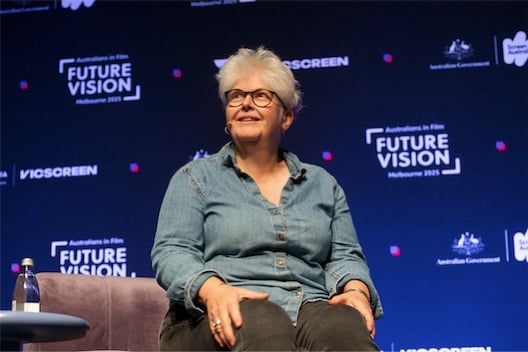Sally Wainwright writes stories that stick. And that’s no accident.
From bus driver to one of Britain’s most celebrated TV writers, Wainwright has created some of the sharpest, best-loved dramas of recent years, including “Happy Valley,” “Gentleman Jack” and “Last Tango in Halifax,” each blending grit, heart and humour.
On Monday, July 14, Wainwright took the stage at Melbourne’s Future Vision television summit, hosted by Australians in Film, VicScreen and Screen Australia at ACMI, for a conversation moderated by local film producer Penny Smallacombe. There, she spoke about her unconventional beginnings, the craft of good storytelling, and why menopause might just be TV’s next punk rock anthem.
“I thought it would leave my mind free to read plays and write more,” she said of her early days driving a London bus, a deliberate choice over taking a civil service job at the time.
“I was always confident that it was going to work. It’s an odd thing, because I’m very shy apart from when it comes to scripts and writing, but for some reason, I’ve always been able to have faith in them.”
Before her breakout hits, Wainwright honed her craft on British staples like “The Archers” and “Coronation Street,” learning that good stories demand hard work and sharp detail. Those lessons shaped later successes like “Last Tango in Halifax.”
“I learned that a story that starts 60 years ago is gold. The longer your story goes back before episode one, the richer it is. You can never have enough detail. I’ll whack down as much as I can before I even touch the script.”
She’s a builder, not a sprinter. “The dialogue is the icing on the cake. I often talk about writing scripts like building a wall.”
“You can’t put the top layer until you’ve built the foundation. I think that’s what writer’s block is: when you haven’t built the foundations.”
Wainwright’s stories never take themselves too seriously. She’s drawn to that sweet spot where darkness meets humour, where characters feel real, flawed, and sometimes funny.
“I think people are funny, you know? Most choose to communicate through humour if they can,” she says. “That’s an important tool with drama.”
She’s wary of dramas that are too “very sincere,” where “you can’t have a funny line.” For her, the best shows blend light and shadow to make characters endearing and human.
“Humour is a universal language. It makes characters more endearing, independent, and human.”
Her next project, “Riot Women” (originally titled “Hot Flush”), is no exception. A six-part BBC and BritBox series, it follows five menopausal women who form a punk rock band to channel their anger, all while crashing a local talent contest.
“I think menopause is finally shaking off its taboo here in England,” Wainwright says. Partnering with Dr. Louise Newson, a vocal advocate for HRT awareness, the series explores the ups and downs of midlife.
“It’s about five women going through menopause, dealing with everything that comes with it. They form a punk rock band as a joke to enter a local talent contest, but they end up expressing themselves and their anger about all sorts of stuff, including mental health. There’s a line in one of the songs: ‘If the menopause happened to blokes, we’d be getting HRT from Tesco.’”
The cast includes Tamsin Greig (“The Archers”), Joanna Scanlan, Rosalie Craig, Lorraine Ashbourne and more.
Plenty of women, she said, can’t wait to see it. Some wonder if men will tune in too. Greig herself asked: “What makes you think men will watch this?” Wainwright laughs off the concern.
“It’s way bigger than that. There aren’t many men on screen, sure, but all the men who worked on post-production have really enjoyed it. At the end of the day, it’s just a good story for anyone who wants one.”
Before wrapping up, Wainwright weighed in on AI and the future of writers.
“We’re all worried about the way things are going with budgets and AI [but] people will always want really good stories. ‘Baby Reindeer’ is a good example … these are things AI can’t invent.”































